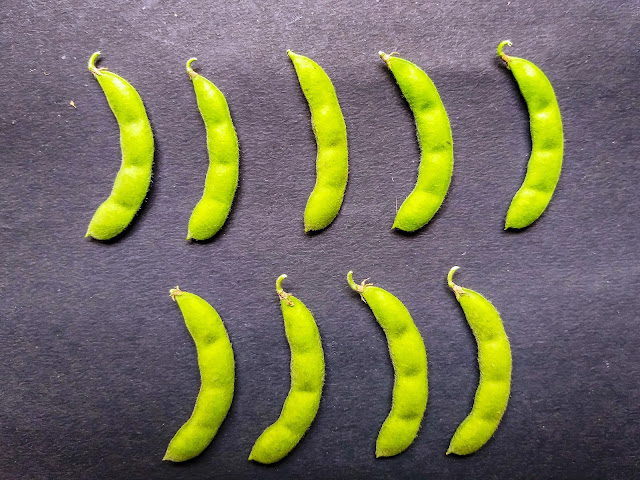नवी दिल्ली येथील भारतीय कृषि अनुसंधान परिषदेच्या केंद्रीय वाण प्रसारण उपसमितिची बैठक दिनांक २६ ऑक्टोबर २०२२ रोजी उपमहासंचालक (पिकशास्त्र) डॉ. टि. आर. शर्मा यांच्या अध्यक्षतेखाली पार पडली, या बैठकीत वसंतराव नाईक मराठवाडा कृषि विद्यापीठाच्या तीन पिकांच्या वाणास मान्यता देण्यात आली. यात विद्यापीठ विकसित तुरीचा वाण बीडीएन-२०१३-२ (रेणुका) हा राष्ट्रीय पातळीवर मध्य भारताकरिता तर सोयाबीनचे एमएयुएस-७२५ आणि करडई पिकाचे पीबीएनएस-१५४ (परभणी सुवर्णा) या वाणास राज्याकरिता लागवडीस मान्यता प्राप्त झाली. सदर वाण मान्यतेबाबतचे पत्र नुकतेच देशाच्या कृषि आणि शेतकरी कल्याण मंत्रालयाकडुन विद्यापीठास प्राप्त झाले असुन या वाणांचे बियाणे हे बीजोत्पादन साखळीमध्ये घेता येणार आहे, यामुळे शेतकरी बांधवामध्ये या वाणांचा प्रचार व प्रसार होण्यास मदत होणार असल्याची माहिती संशोधन संचालक डॉ. दत्तप्रसाद वासकर यांनी दिली. वाण विकसित करण्याकरिता योगदान देणा-या शास्त्रज्ञांचे कुलगुरू मा डॉ इन्द्र मणि आणि संशोधन संचालक डॉ दत्तप्रसाद वासकर यांनी अभिनंदन केले आहे.
या वाणातील तुर पिकांतील रेणुका वाणास महाराष्ट्र, गुजरात, मध्य प्रदेश, राजस्थान, छत्तीसगड आदी राज्याकरिता लागवडीकरिता प्रसारण करण्याची मान्यता देण्यात आली आहे तर सोयाबीन चे एमएयुएस-७२५ आणि करडई पिकांचे पीबीएनएस १५४ (परभणी सुवर्णा) हे राज्याकरिता लागवडीस मान्यता प्राप्त झाली.
तीन वाणाची थोडक्यात माहिती
तुरीचा बीडीएन-२०१३-२ (रेणुका) वाण : तुरीचा रेणुका हा वाण विद्यापीठ अंतर्गत असलेल्या बदनापुर येथील कृषि संशोधन केंद्राने विकसित केलेला असुन हा वाण महाराष्ट्र, गुजरात, मध्यप्रदेश, राजस्थान आणि छत्तीसगड या मध्य भारत प्रभागासाठी प्रसारीत करण्यासाठी मान्यता देण्यात आली आहे. हा वाण बीएसएमआर-७३६ मादी वाण वापरुन आयसीपी-११४८८ हा आफ्रीकन दाते वाण संकरीत करुन निवड पध्दतीने तयार करण्यात आला आहे. हा वाण १६५ ते १७० दिवसात तयार होतो तसेच मर रोगास प्रतिकारक असून वांझ रोगास प्रतिबंधक आहे. या वाणाचे १०० दाण्याचे वजन ११.७० ग्रॅम असुन फुलांचा रंग पिवळा तर शेंगाचा रंग हिरवा आहे, दाणा लाल रंगाचा आहे. या वाणाचे सरासरी उत्पादन क्षमता हेक्टरी १८ ते २० Ïक्वटल आहे.
सोयाबीनचा एमएयुएस-७२५ वाण : अखिल भारतीय समन्वयीत सोयाबीन संशोधन प्रकल्पाव्दारे विकसित हा वाण महाराष्ट्र राज्याकरिता प्रसारित करण्यात आला आहे. हा वाण ९० ते ९५ दिवसात लवकर येणारा वाण असुन अर्ध निश्चित वाढ चिरकी मोठी व गडद हिरवी पाने असलेला शेंगाची जास्त संख्या व २०-२५ टक्के चार दाण्यांच्या शेंगा असलेला वाण आहे. बियाणाचा आकार मध्यम असुन १०० दाण्यांचे वजन १० ते १३ ग्रॅम आहे. हा वाण किड व रोगास मध्यम प्रतिकारक असुन हेक्टरी उत्पादन क्षमता सरासरी २५ ते ३१.५० क्विंटल आहे.
करडई पिकांचे पीबीएनएस १५४ (परभणी सुवर्णा) वाण : अखिल भारतीय समन्वयीत करडई संशोधन प्रकल्पाव्दारे विकसित हा वाण महाराष्ट्र राज्याकरिता प्रसारित करण्यात आला आहे. हा वाण कोरडवाहु आणि बागायती लागवडीसाठी उपयुक्त असुन यात तेलाचे प्रमाण अधिक (३०.९० टक्के) आहे. हा वाण मर रोग आणि अल्टरनेरिया रोग आणि मावा किडीस सहनशील आहे. या वाणाचे हेक्टरी उत्पादन क्षमता कोरडवाहु मध्ये १० ते १२ क्विंटल तर बागायतीमध्ये १५ ते १७ क्विंटल आहे.
सोयाबीनचा एमएयुएस-७२५ वाण
करडई पिकांचे पीबीएनएस १५४ (परभणी सुवर्णा) वाण
National level notification of Three Crops varieties developed by VNMAU, Parbhani
Three
crop varieties developed by the Vasantrao Naik Marathwada Agricultural
University (VNMAU), Parbhani has recommended for the notification by Central
Sub-Committee on Crops Standards, Notification and Release of Varieties of
Agricultural Crops (CSC on CSN & RV). The Sub-Committee approved the
varieties in the 89th meeting held on 26th October, 2022,
at Indian Council of Agricultural Research (ICAR), New Delhi under the
Chairmanship of Dr. T.R.Sharma, Deputy Director General (Crop Sciences), ICAR,
New Delhi. In this meeting, the Sub-Committee has
given approval for notification of VNMAU developed Pigeon pea variety
BDN-2013-2 (Renuka) at national level for cultivation in Central
India ((Maharashtra, Gujarat, Madhya Pradesh, Rajasthan and
Chhattisgarh), while MAUS-725 variety of soybean and
PBNS-154 (Parbhani Suvarna) of safflower crop has approval for
notification to cultivate in the Maharashtra State, said Director of Research (VNMAU) Dr.D.P.Waskar.
Hon'ble Vice-Chancellor of the University Dr. Indra Mani congratulated breeders Dr. D.K.Patil (pigeon pea), Dr. S.P.Mehtre (Soybean), Dr. S.P.Ghuge (Safflower) and all concerned scientists who contributed for development of these three varieties of the University. He also asserted that our best efforts to provide appropriate technologies to farmers particularly those of Maharashtra will continue.
The university has recently received the letter regarding the approval of the said varieties from the Union Ministry of Agriculture and Farmers Welfare. With this notification, the quality of the seeds of these varieties can be regulated and these seeds shall be sold for the purpose of agriculture in the recommended area.
Salient Features of these Varieties
Pigeonpea genotype Renuka (BDN 2013-2) : This variety developed by Agricultural Research Station, Badnapur under VNMAU, Parbhani is one of the leading pulses research station in India. This variety developed through crossing of BSMR 736 and ICP 11488 (African donors) by pedigree selection method. This variety has characteristics yellow colour flower, green colour pod with red seed having test weight of 11.70 gm with moderately resistant to wilt and resistant to sterility mosaic disease. The genotype is having medium duration maturity of 165 to 170 days with yield of 18-21 qt /ha at experimental trial at National level.
Soybean Variety MAUS-725 : The variety has characteristics of early maturity (90-95 days), semi determinate, lanceolate broad and dark green leaves, high number of pods and 20-25 per cent four seeded leaves, medium seed size (test weight 10 to 13 gm), moderately resistance to pest and diseases. The variety recorded seed yield of 25 to 31.50 qt / ha at experimental trial.
Safflower variety PBNS-154 : The seed of this variety content high oil percentage i.e. 30.90 per cent oil. The variety matures in 124-126 days under rainfed and 134-136 days in irrigated condition. The variety is tolerant to Alternaria leaf spot under protected and unprotected conditions. The variety is moderately resistant to fusarium wilt disease and aphid. Recorded yield of this variety at experimental trial is 10 to 12 qt/ha under rainfed condition while 15-17 qt/ha under irrigated condition.





